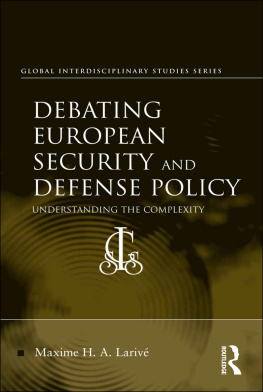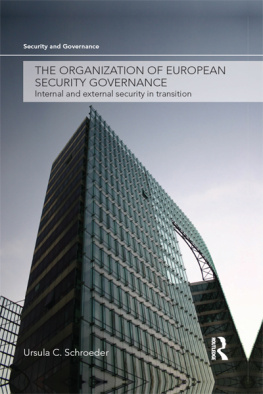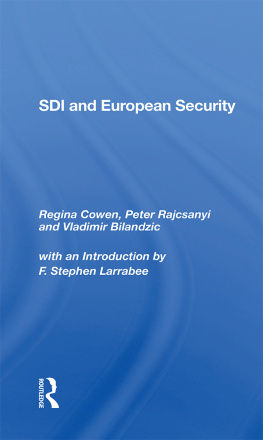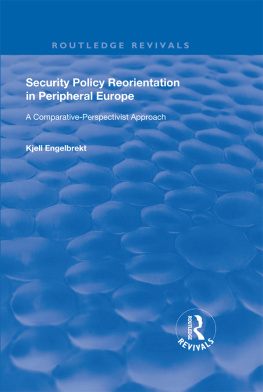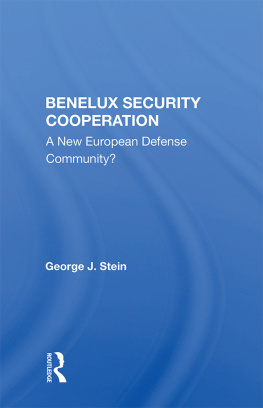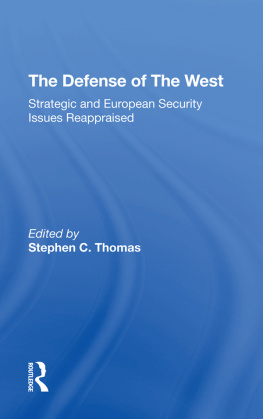DEBATING EUROPEAN SECURITY AND DEFENSE POLICY
Global Interdisciplinary Studies Series
Series Editor: Sai Felicia Krishna-Hensel
Interdisciplinary Global Studies Research Initiative,
Auburn University at Montgomery, USA
The Global Interdisciplinary Studies Series reflects a recognition that globalization is leading to fundamental changes in the world order, creating new imperatives and requiring new ways of understanding the international system. It is increasingly clear that the next century will be characterized by issues that transcend national and cultural boundaries, shaped by competitive forces and features of economic globalization yet to be fully evaluated and understood. Comparative and comprehensive in concept, this series explores the relationship between transnational and regional issues through the lens of widely applicable interdisciplinary methodologies and analytic models. The series consists of innovative monographs and collections of essays representing the best of contemporary research, designed to transcend disciplinary boundaries in seeking to better understand a globalizing world.
Also in the series
Shifting Priorities in Russias Foreign and Security Policy
Edited by Roger E. Kanet and Rmi Piet
ISBN 978-1-4094-5415-1
Religion, Education and Governance in the Middle East
Between Tradition and Modernity
Edited by Sai Felicia Krishna-Hensel
ISBN 978-1-4094-3986-8
New Security Frontiers
Critical Energy and the Resource Challenge
Edited by Sai Felicia Krishna-Hensel
ISBN 978-1-4094-1979-2
Cities and Global Governance
New Sites for International Relations
Edited by Mark Amen, Noah J. Toly, Patricia L. McCarney and Klaus Segbers
ISBN 978-1-4094-0893-2
Debating European Security and Defense Policy
Understanding the Complexity
MAXIME H. A. LARIV
University of Miami, USA
First published 2014 by Ashgate Publishing
Published 2016 by Routledge
2 Park Square, Milton Park, Abingdon, Oxon OX14 4RN
711 Third Avenue, New York, NY 10017, USA
Routledge is an imprint of the Taylor & Francis Group, an informa business
Copyright Maxime H. A. Lariv 2014
Maxime H. A. Lariv has asserted his right under the Copyright, Designs and Patents Act, 1988, to be identified as the author of this work.
All rights reserved. No part of this book may be reprinted or reproduced or utilised in any form or by any electronic, mechanical, or other means, now known or hereafter invented, including photocopying and recording, or in any information storage or retrieval system, without permission in writing from the publishers.
Notice:
Product or corporate names may be trademarks or registered trademarks, and are used only for identification and explanation without intent to infringe.
British Library Cataloguing in Publication Data
A catalogue record for this book is available from the British Library
The Library of Congress has cataloged the printed edition as follows:
Lariv, Maxime H. A.
Debating European security and defense policy : understanding the complexity / by Maxime H. A. Lariv.
pages cm.(Global interdisciplinary studies series)
Includes bibliographical references and index.
ISBN 978-1-4724-0995-9 (hardback)ISBN 978-1-3155-7601-5 (ebook)ISBN 978-1-3171-5429-7 (epub) 1. European Union countriesMilitary policy. 2. European Union countriesDefenses. 3. National securityEuropean Union countries. 4. Strategic cultureEuropean Union countries. 5. Common Security and Defence Policy. I. Title.
UA646.L346 2014
355.03354dc23
2014015353
ISBN 9781472409959 (hbk)
ISBN 9781315576015 (ebk-PDF)
ISBN 9781317154297 (ebk-ePUB)
Contents
To Cristina
List of Boxes, Charts, Figure and Tables
Boxes
Charts
Figure
Tables
Foreword
Scholarship on the EUs Common Security and Defence Policy (CSDP) now fills dozens of shelves in any decent research library. Broadly speaking, the tenor and tone of this massive enterprise breaks down into two distinct periods. Prior to 2009, the overall mood was upbeat, optimistic and constructive. Most scholars writing in the late 1990s and early 2000s were confident that the creation of a European defense capacity was an important new development, both for European integration and for European security. The United States was already tilting away from the old continent and, as Europeans discovered in former Yugoslavia, was extremely reluctant to continue to play its traditional role of hegemon of last resort. Europe needed its own autonomous security project and, within a few short years, it appeared to have acquired oneand a dynamic one at that. The first missions dated from 2003 and were widely deemed to be relatively successful. By combining military and civilian instruments in a new way, CSDP appeared to be blazing a new trail in international relations. Academic and policy analysts found these developments exciting, innovative and full of promise. Some even went as far as to suggest that CSDP would contribute to the forging of a European identity.
All this began to change around the time of the ratification of the Lisbon Treaty. The mood among scholars switched to one of uncertainty, pessimism, skepticism. Even as the Treaty appeared to confer on the project new institutional and capacity-generating instruments, analysts became far more critical, more negative in their assessment. While 26 missions were launched between 2003 and 2008, none was launched between 2009 and 2011. The Arab Spring, the most serious security challenge since the Yugoslav wars exactly 20 years previously, suggested that CSDP was still an infant in diapers. The Libyan crisis, by any measure precisely the type of scenario CSDP had been devised to tackle, saw the project totally by-passed as member states quarreled over an appropriate response and the intervention mission was assumed by NATO. Thereafter, the talk in policy and analytical circles was of the need to re-think CSDPs relationship with NATO.
The explanation for this switch in CSDPs fortunes is complex and multifaceted. The project was undoubtedly oversold from the outset, both by European analysts (myself included) and by Americans, who detected a case of the EU balancing against the US (how wrong can you get?). The extent to which the member states intended to keep it on a tight leash was disguised by the proliferation of missions in the early years. The rapid drafting (2003) of the European Security Strategy created the illusion that the EU knew what it was attempting to achieve. The volatility and instability of the neighborhood was massively underestimatedas events in Georgia, North Africa and Ukraine were shortly to prove.
Maxime Larivs book tackles this complexity head-on. He offers us a surefooted guide through the CSDP labyrinth, robustly rejecting linear or mono-causal approaches. For each of the key issues at the heart of the project, both theoretically and empirically, he establishes a debate between contending interpretations. Much like the CSDP project itself, he produces a tool-box of analytical instruments, inviting his readers to explore both sides of each argument and allowing them to choose for themselves the most convincing explanatory model. At the same time, he frames the CSDP story in a truly global context, in a world where patterns of international relations are evolving very rapidly, where emerging powers and non-state actors are changing the rules of the game in new and unfamiliar ways, yet in which traditional actors still hold sway, from Iraq to Crimea, in ways which are, alas, all too familiar. The grand vision of Saint-Malo, Lariv concludes, has faded. No heroic leader, bent on prestige, has emerged to drive the project forward. There is no strategic vision. Every drop of European energy is currently being expended on solving the Eurozone crisis and there is precious little left to devote to a policy area which remains in thrall, in very different ways, to the big member states, especially France, Germany and the UK (and who knows what the latter will do next?). Larivs book will serve as a precious resource for all those who wish to grapple from the inside with the complexity, indeed with the many contradictions, of the CSDP.


